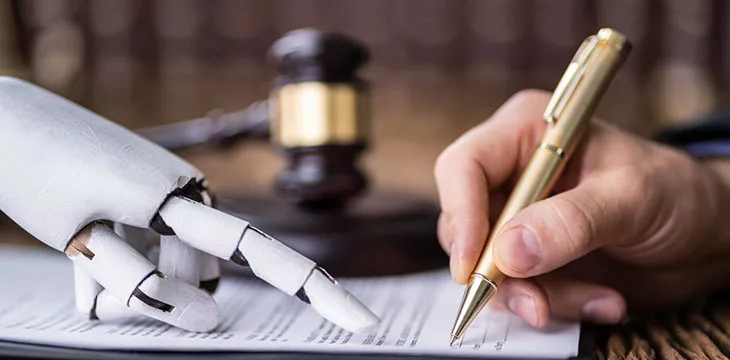|
Getting your Trinity Audio player ready...
|
The Philippines’ legal system is bracing for a seismic shift with the planned integration of artificial intelligence (AI) into court processes. However, concerns for the job security of employees trail the move.
Supreme Court Chief Justice Alexander Gesmundo disclosed the country’s plans with AI, noting that integration will enhance the efficiency and productivity of the legal system. Gesmundo made his submissions at a stakeholders meeting to discuss the Strategic Plan for Judicial Innovations 2022-2027.
In his speech, Gesmundo remarked that public members will use AI kiosks to inquire into court processes and procedures in a self-help manner, providing answers to their inquiries. AI is expected to appear inside courtrooms via text-to-speech tools to record testimonies of witnesses and other processes.
However, some concerns integrating AI in Filipino courts may lead to the redundancy of employees in the legal system. Customer care staff and stenographers face the most significant risks of AI replacement, although Gesmundo said the integration will not affect jobs.
“Court employees serve as the very backbone of our judicial system,” said Gesmundo. “The text to voice AI will not eliminate the job of our stenographers but will make them more efficient and reliable.”
Court employees would be supported to receive additional training to equip them with new digital skill sets, Gesmundo said. He cited the example of automation and new technologies playing a key role in creating more jobs throughout history, stating that AI will also create new jobs.
“The experience of developing countries has proven that technological advances can assist in improving institutional reforms and enhancing their impacts,” Gesmundo said.
The Philippines has been experimenting with AI and other emerging technologies in several sectors. The Justice Department announced a plan to use the technology to combat human trafficking at the nation’s airports.
To ensure the safe usage of AI technology, the University of the Philippines has confirmed the start of research in a valiant attempt to explore a viable regulatory framework. Despite the push by the Department of Trade Industry (DTI) to obtain funding for the development of an AI research center, it has been rejected by the country’s Senate for the second time.
Changing the face of workplace
Opinion has been split over the future of work with the mass adoption of generative AI systems in the workplace. One demographic argues that there is no cause for alarm that AI will not replace employees but improve work environment efficiency.
An IBM report noted that up to 40% of employees will require upskilling to remain competitive in the workplace, affecting up to 2 billion individuals. Currently, 70% of CEOs in the U.S. have designated generative AI as an investment priority, hinting at increased integration of AI tools or investment in employee skills.
In order for artificial intelligence (AI) to work right within the law and thrive in the face of growing challenges, it needs to integrate an enterprise blockchain system that ensures data input quality and ownership—allowing it to keep data safe while also guaranteeing the immutability of data. Check out CoinGeek’s coverage on this emerging tech to learn more why Enterprise blockchain will be the backbone of AI.
Watch: eGov super app opens the best opportunities for Philippines

 02-17-2026
02-17-2026 




